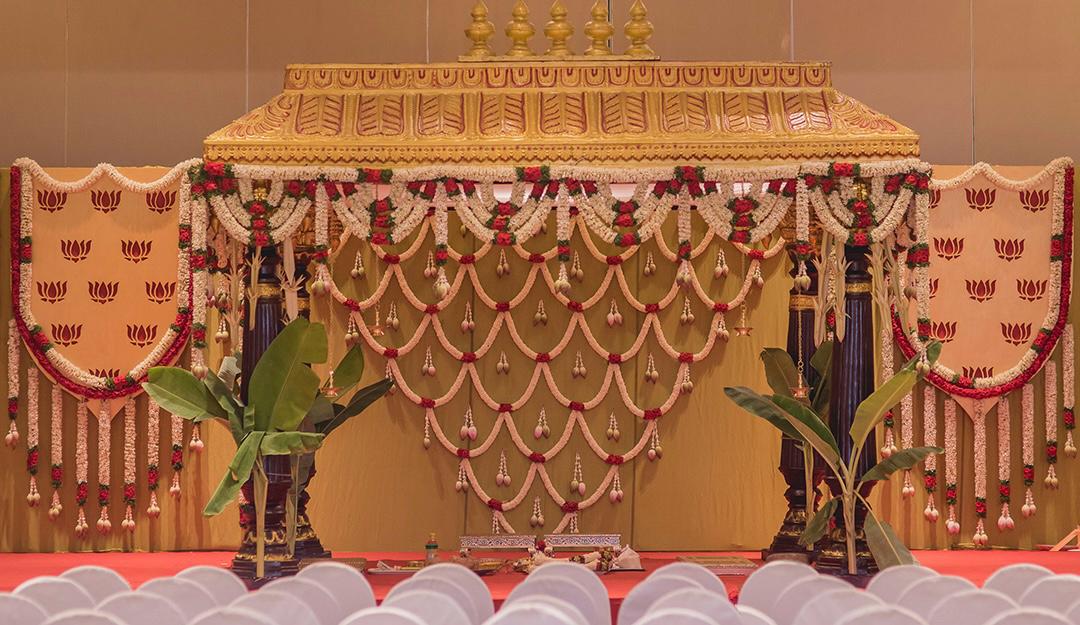
In the kaleidoscope of traditions and rituals that adorn an Indian wedding, there exists captivating ritual that transcends mere aesthetic appeal – the use of fragrant flowers during the auspicious muhurtham ceremony. Rooted in ancient customs and imbued with symbolism, the presence of fragrant blooms adds a layer of spirituality and reverence to the sacred union of two souls. Let us delve into the profound significance of these floral offerings, where the couple is likened to the divine, and every petal carries the essence of the divine aura.
In the tapestry of Indian culture, marriage is not just a union of two individuals but a sacred bond that intertwines two families, two souls, and two destinies. It is often said that the union of marriage is akin to a divine merger, where the couple is compared to gods themselves. Just as gods are believed to reside in the presence of fragrance, flowers become indispensable in adorning the sanctity of the marital union.
The muhurtham ceremony, marking the most auspicious time for the wedding vows to be exchanged, is steeped in symbolism and spiritual significance. It is during this celestial moment that the couple embarks on their journey together, seeking the blessings of the divine for a harmonious and blissful life ahead. The fragrance of flowers, permeating the air, serves as a metaphor for the divine grace surrounding the union, enveloping the couple in its ethereal embrace.
Every flower used during the muhurtham ceremony carries profound symbolism, reflecting the qualities desired in a marital bond. Roses, with their sweet fragrance, symbolise love, passion, and purity of emotions, essential for fostering a strong and enduring relationship. Jasmine, with its delicate white blossoms, represents purity, beauty, and auspiciousness, infusing the atmosphere with a sense of divine grace and blessings.
Furthermore, the presence of fragrant flowers not only appeals to the senses but also creates a serene and uplifting ambiance, elevating the spiritual vibrations of the ceremony. As the couple exchanges vows amidst the floral-adorned mandap, the fragrance of blossoms creates an aura of tranquility and devotion, invoking the presence of divine blessings and celestial beings.
In the sacred scriptures and ancient texts of India, flowers hold a special place in religious ceremonies and rituals. They are believed to possess divine energy and are offered as a token of reverence and devotion to the gods. Similarly, during the muhurtham ceremony, the couple is likened to deities, and the fragrant flowers serve as offerings to invoke the blessings of the divine for a prosperous and fulfilling marital life.
Beyond their aesthetic appeal, fragrant flowers carry a deeper spiritual significance, reminding the couple of the sacredness of their union and the divine blessings that accompany it. Just as a flower unfolds its petals to reveal its inner beauty and fragrance, so too does marriage blossom and flourish when nurtured with love, respect, and devotion.
In essence, the use of fragrant flowers during the muhurtham ceremony at an Indian wedding symbolises the divine presence, the sanctity of the marital bond, and the eternal blessings bestowed upon the couple as they embark on their journey together. Like a fragrant flower blooming amidst a verdant garden, may their love blossom and spread its fragrance, filling their lives with joy, harmony, and everlasting happiness.








Leave a comments